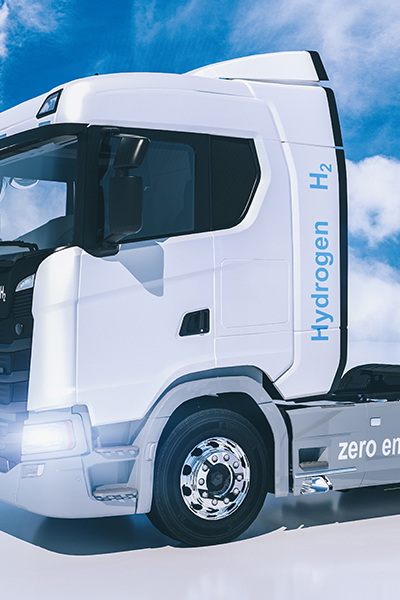
Net Zero Transport
Transport is essential to the functioning of UK business, but it is responsible for over a third of the UK’s total carbon emissions.
Business transport emissions are generated by a variety of sources: not just the transportation of raw materials, finished goods and waste products, but also the way that customers and workers reach the business.
A net zero transport strategy focuses on all the different types of transport connected with the business and aims to drive down emissions for all of them. For the transport of goods and waste materials, this might mean optimising journeys for maximum efficiency.
For delivery vehicles and company cars, it might mean investing in electric or hydrogen vehicles (new petrol/diesel cars and vans will be banned from sale in 2030). And for customers and workers, it might mean supporting modal shift: encouraging people to choose alternatives to the petrol or diesel engine where possible.

Business benefits of cutting your transport emissions:

More productive workers: research shows that people who walk or cycle to work are more productive when they get there and take fewer sick days.

New customers: more than 1 in 5 people in the UK have no access to a car, and businesses that ignore non-drivers are excluding 20% of their potential market. By supporting alternative modes of transport, you will boost sales.

Freeing up space on site: if fewer people are using cars and vans to reach your site, this will take pressure off the parking spaces. (You can fit 10 secure cycle parking spots in the same space as one car.) You may even be able to reallocate some of your car parking space for another purpose.
Types of low-carbon transport
Hydrogen-powered vehicles
Hydrogen is technically a zero-emissions fuel because it generates power through a chemical reaction rather than combustion. Currently, most hydrogen isn’t as green as it looks on paper because it requires fossil fuels to produce, but some UK businesses are already exploring the potential of hydrogen fleets as part of their net zero strategy.
Electric vehicles
The official incentives to go electric keep getting stronger: the Workplace Charging Scheme, the Plug-In Grant and the forthcoming phase-out of petrol and diesel vehicles. To make electric vehicles the greenest possible option, they should be fuelled with renewable energy.
Public transport
When you encourage customers and employees to use public transport, even if it’s not in low-emission vehicles, you are not just helping to cut their emissions per journey; you’re also supporting the existence of alternatives to the private car and helping others to make different choices too.
Active travel
The greenest possible way to get around is under your own steam. But it’s important that your company’s active travel scheme includes people who are less fit and able. This means encouraging e-bikes, trikes and mobility scooters as well as regular cycles.








